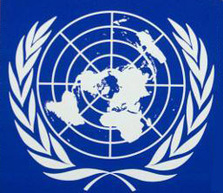UN and Qatari Leaders in Doha Commit to Addressing Water and Food Security Risks Aggravated by Climate Change
DOHA, QATAR
Leaders from across the United Nations system and the State of Qatar gathered at a side event during the Doha Climate Conference to highlight how the UN is working to help people across the world live with the increasing impacts of climate change, particularly threats to water and food security.
Secretary-General Ban Ki-moon said the UN remained committed to pursuing various options to address climate change and emphasized that the United Nations will use all the tools at its disposal to meet the needs of people now and in the future.
“We are very much committed,” the Secretary-General said. “We have a political and moral responsibility to our future generations—we are borrowing our future from our next generation.”
The Doha event brought together UN agency leaders, State of Qatar officials, the World Water Council and ministers from Brazil, Nauru and South Africa to discuss sustainable solutions to the challenges of climate change, particularly in the world’s drylands.
Abdullah bin Hamad Al-Attiyah, President of COP-18 opened the event by stating: “Food and water availability are affected by climate change, and they affect the livelihood of many people in dry lands all over the world. New international challenges mandate new approaches to solutions.”
“I am glad the Government of Qatar has chosen to focus this event on climate change and food security,” Mr. Ban said. “We see the threat here in Qatar and across the world’s drylands.”
The Secretary-General commended the State of Qatar for its leadership on both food security and climate change and for showcasing the responsibility needed at the international level as a member of the global community.
Executive Chairman of the Qatar National Food Security Programme, Fahad bin Mohamed Al-Attiya said that climate change posed a severe challenge to Qatar as the country imports 90-95 per cent of its food and gets almost all of its water through desalinization, which consumes considerable energy. “We are completely dependent and we are very alarmed.”
Al-Attiya said Qatar has spearheaded the development of the Global Dry Land Alliance to promote collaboration among dry land countries to meet the challenges of food and water insecurity by harnessing the best of scientific, technological and financial resources on a sustainable basis.
Since 2007, 29 UN organizations have pledged to work together for climate change action through the UN system Chief executives Board for Coordination, led by the Secretary-General.
Helen Clark, Administrator of the United Nations Development Programme, said that tackling climate change can help accelerate economic and energy transformations, drive revolutions in technology, and spur the creation of new production models. Climate action, she said, “can drive the creation of new goods, services, jobs, and exports. It can create new opportunities for both developing and developed countries.”
United Nations Framework Convention on Climate Executive Secretary Christiana Figueres said Qatar had helped bring the issue of food and water scarcity to the attention of the highest levels of the UN. The nexus between food, water and energy, she said, “is the face of climate change. It is the challenge, but at the same time the solution.”
World Bank Vice President for Sustainable Development Rachel Kyte said there is urgency to the problem, as 850 million people presently go to bed hungry and that would only get worse as the world approaches a four degree temperature rise.
“The climate is changing in front of our eyes and affecting food security, energy, health and water” says World Meteorological Organization Secretary General Michel Jarraud. “Climate change is going to change patterns and increase vulnerabilities, either in terms of too much water or too little water.”
UN Environment Programme Executive Director Achim Steiner said that progress does not have to come at the expense of the environment. “UNEP is challenging the notion that if you are greening your economy you are killing jobs. You are actually creating jobs instead, by investing in technological solutions,” he stated.
The food security situation in the world’s drylands is expected to become more acute in the near future. According to the UN Convention to Combat Desertification, over the next 20 years, about 50 per cent more food will be needed, 40 per cent more energy and 35 per cent more water will be needed. Yet every year, 75 billion tons of fertile soil is lost for good, slowly eating away at the six-inches or so of topsoil that is vital for agriculture and 12 million hectares of productive land that could produce 20 million tons of grain is lost to land degradation and drought alone.



